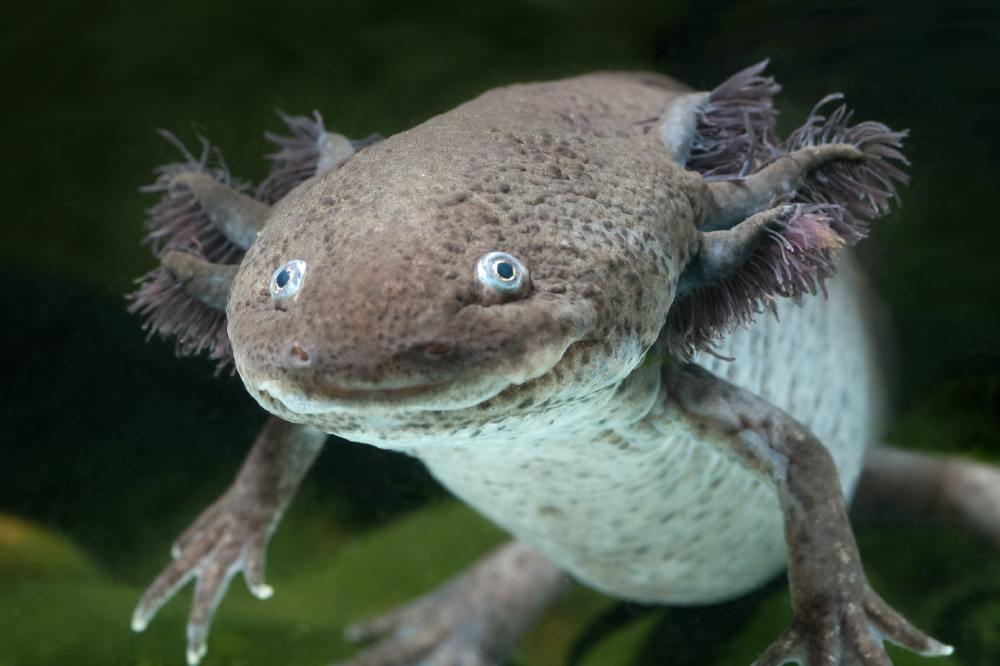Consider the neck of the giraffe, the fact a cow has four stomachs, and the genus-bending strangeness of the platypus.

Rare goggle-eyed Axolotl
So far so standard, but when you delve into the darkest corners of the animal kingdom, you’ll find some verystrange creatures lurking there.
To mark World Wildlife Day, these critters put the weird and wonderful into creatures great and small…
1. Orchid Mantis

The definition of the phrase ‘beautiful but deadly’, this delicate predator possesses leg lobes like petals and mandibles like budding flowers. Rivalling stick insects for the animal kingdom’s best (and most herbaceous) camouflage, the orchid mantis comes in as many different colours as its namesake, and can change hue subtly to suit its surroundings. First documented by a British explorer in the forests of South East Asia, the mantis put on such a convincing show he thought he’d discovered a carnivorous plant.
2. Saiga Antelope
What do you get if you cross a deer with a vacuum cleaner? In reality you get a very scared deer, but if you’ll indulge us for a moment, the saiga antelope looks like it could do a slap-up job with your bedroom carpet – or as an extra in Star Wars. The bizarre, trunk-like nose is designed to warm cold air before it reaches the lungs, essential in the hostile habitats the saigas call home.
Sadly, their recent history has been far from comical. In 2015, a rare bacterium causing blood poisoning swept their breeding grounds in central Asia, wiping out 60% of the global population in just three weeks.
3. Axolotl

Rare, unpronounceable, and endearingly goggle-eyed, the axolotl is unusual in almost every way. Widely known as “the walking fish”, these Mexican salamanders remain aquatic and gilled their entire adult lives, are studied extensively by scientists for their extraordinary ability to regenerate limbs, and retain so many juvenile characteristics they effectively never grow up. Once a staple of the Aztec diet, today axolotls are extremely common in geneticists’ laboratories, and almost extinct in the wild.
4. Lowland Streaked Tenrec
Never has a real, living animal looked more like a Pokemon. The size of a kitten and nearly as adorable, this Madagascan mammal is often mistaken for an exotic hedgehog thanks to its bulwark of bumblebee-coloured quills.
Its USP is that it uses these quills for stridulation – a form of communication that creates sound by rubbing body parts together, much like a needle dragging across an LP. Normally reserved for insects and snakes, the tenrec is the only mammal known to employ the technique.
5. Venezuelan Poodle Moth
If not the weirdest entry in our catalogue of curiosities, the Venezuelan poodle moth is at least the most mysterious. Somewhere between a mosquito and a Furby, this cuddly critter was only discovered in 2009, when it was photographed by zoologist Arthur Anker in the depths of the Canaima National Park. Cute or terrifying, depending who you ask, the moth has evaded subsequent expeditions, so Anker’s unedifying pics remain our sole source.
6. Gooty Sapphire Spider

We’re guessing not everyone will appreciate the aesthetic qualities of this giant, fearsome tarantula. A spider of many names, this beautiful blue-and-gold critter is known variously as the Gooty sapphire ornamental tree spider, the metallic tarantula, and the peacock parachute spider. Arachnophobes needn’t fear – this eight-legged freak lives solely in the forests of central India.
7. Superb Bird of Paradise
Mating season does strange things to male superb birds of paradise. A relatively run-of-the-mill songbird, albeit with an unusually vibrant neck, an arriving female sparks a remarkable transformation into an oval-shaped hell creature with legs.
The ‘eyes’ are really smudges of turquoise feather, and the male will carefully scrub its chosen dancefloor with leaves before beginning its peacock-like splay. When viewed front on, it looks a bit like one of those Freeview boxes you can get for your TV.
8. Glass Frog
A dream come true for biologists, and a slightly gross science lesson for everybody else, these tiny frogs have wholly transparent underbellies, leaving their internal organs on display for all to see. There’s a little beating heart, food funnelling into the stomach, and in pregnant females, a little sac of eggs.
Tree-dwellers from Latin America, glass frogs are intensely difficult to spot, as they spend most of their time clinging to the undersides of leaves.
9. Maned wolf

A strangely unsettling sight, the maned wolf looks like a fox with the legs of a deer, or possibly a dining room table. Biologically neither wolf nor fox, it’s the sole species in the genus chrysocyon – derived from the ancient Greek for ‘golden dog’ – and its ridiculous, overlong limbs are evolved to help it see above the long grasses of the South American savanna.
An omnivore that eats everything from berries to armadillos, almost nothing about the maned wolf is normal, and its cry is a sonorous, guttural sound often termed a ‘roar-bark’. Weirdest of all, maned wolf urine smells so strongly of cannabis that Rotterdam Zoo was once raided by police after a tip-off from a confused passer-by.
10. Mexican Mole Lizard
Nature’s monument to compromise, this faintly repulsive reptile looks like an earthworm, moves like a snake, lives like a mole, and actually is a lizard. It spends most of its time underground, emerging only at night or after rainfall, whereupon it drags its long, sinuous body across the soil using a rather pudgy pair of front legs. Of its back legs only vestigial bones remain – visible via X-ray – and, on closer inspection, it’s actually quite cute.

